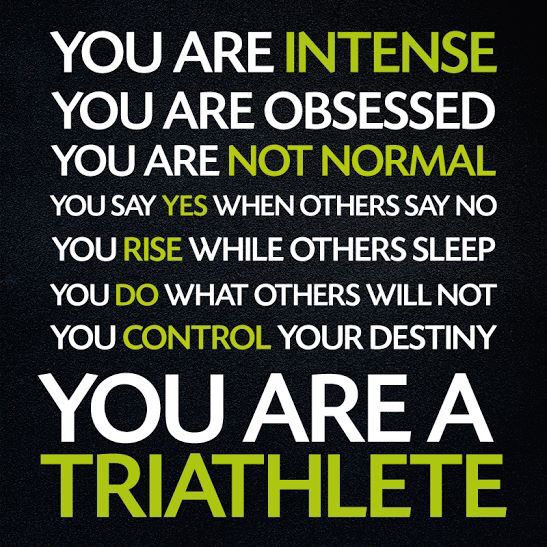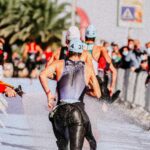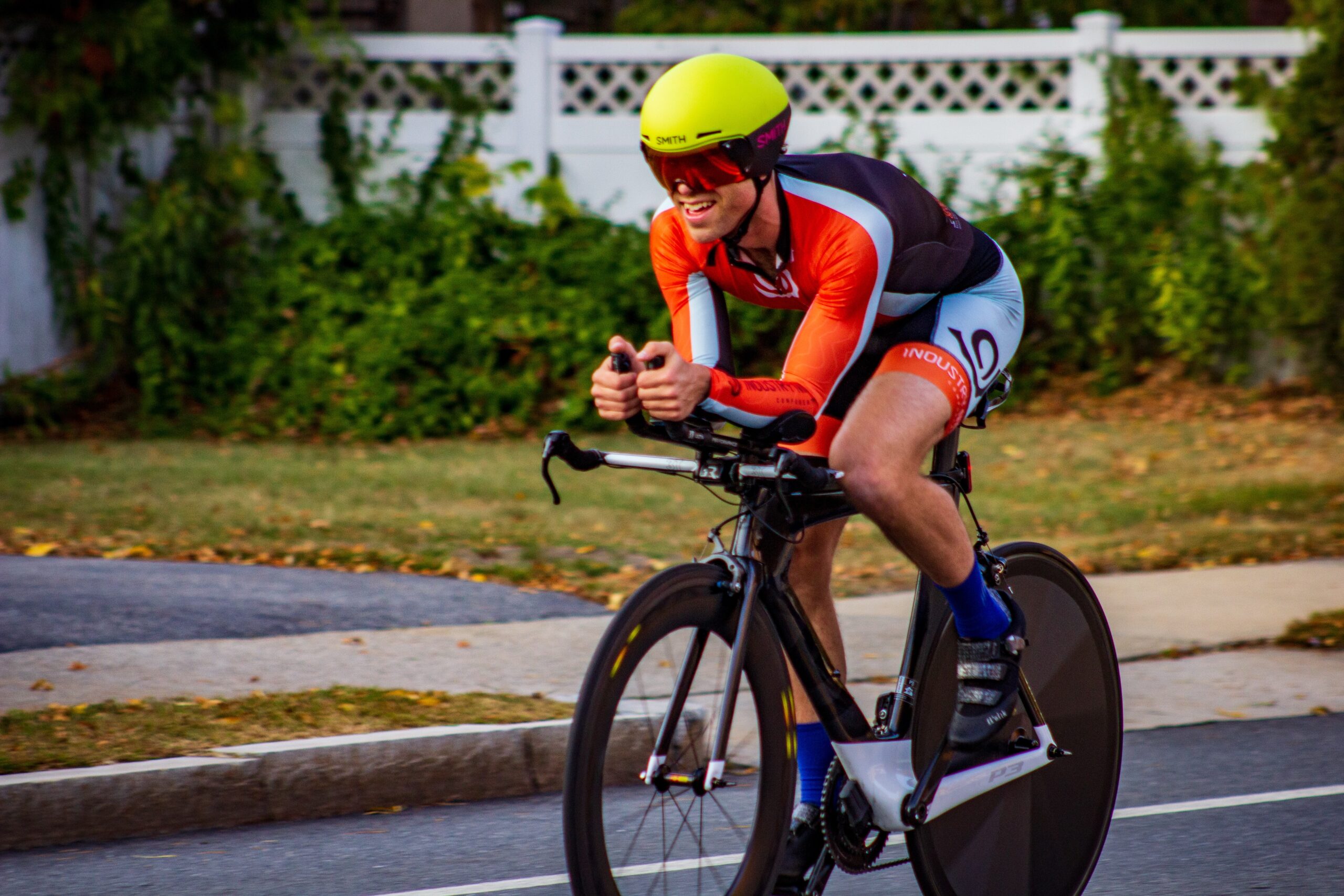Motivation, simply defined, is your determination and drive to achieve your triathlon goals. To perform your best, you must want to begin the process of developing as an triathlete and you must be willing to maintain your efforts until you have achieved your goals. Motivation lies at the foundation of everything you do as an triathlete. Without your desire and determination to commit the time and do the work necessary to develop as an triathlete, pursuit of your triathlon goals would end in failure. To become the best triathlete you can be, you must be motivated to do what it takes to maximize your ability.
Motivation is essential for triathlon success for several reasons. First, it involves putting in consistent effort in every areas of your life that affects your triathlon performance. It influences the effort you put into your physical conditioning, discipline training, equipment preparation, and mental training. Motivation also plays a big role in how your general lifestyle impacts your triathlon including sleep, eating habits, school or work, and relationships. Second, motivation determines your willingness to continue to work hard in the face of fatigue, boredom, pain, and the desire to do other things. Your motivation also influences whether you make triathlon your number-one priority in your life. To be sure, though you may love your triathlon, you are also faced with other competing interests including school or work, other hobbies, and your social life. How you prioritize your triathlon in your life will impact the choices you make in terms of how you spend your time and energy.
The reason motivation is so important is that it is the only contributor to triathlon performance over which you have control. There are three things that impact how well you perform. First, your ability as an triathlete which includes your innate physical talent and inborn psychological attributes. Because triathlon ability is something you are born with and limited by, it is outside of your control.
Second, the difficulty of the competition influences how you perform. Contributors to difficulty include the strength of the field, weather, and conditions at the race venue (e.g., cold water, headwinds, rough road surface). You have no control over these factors.
Finally, motivation will impact performance. Motivation directly influences the level of success that you ultimately achieve. If you are highly motivated to improve your performances, then you will put in the time and effort necessary to fully develop yourself as an triathlete—physical, technical, mental. Motivation will also influence the level of performance when you race. If you’re competing against others of nearly equal fitness and skill, it will not be ability that will determine the outcome. Rather, it will be the triathlete who works the hardest, who doesn’t give up, and who performs their best when it counts. In other words, the triathlete who is most motivated to perform their best.
Prime motivation involves an unwavering commitment to do what is necessary to perform at your highest as you strive toward your triathlon goals. It means continuing to work hard in the face of challenges, setbacks, and failure. Prime motivation ensures that triathlon will be your top priority and that the choices you make in your life best serve the pursuit of your goals (while not neglecting other essential aspects of your life such as family and work). It involves an ongoing determination to do your best as well as a day-to-day dedication to giving your fullest effort in everything that will impact your triathlon performances.
Effort = Goals?
When I speak to groups of young triathletes, I always ask how many have big goals, like going to the Olympics or racing Kona. At least 90% always raise their hands with great enthusiasm. I then ask how many are doing everything they can to achieve their goals. Only one or two tentative hands go up. What this tells me is that there is often a big gap between the goals triathletes have and the effort they are putting into those goals. It’s easy to say that you want to be a successful triathlete. It is much more difficult to actually make it happen. If you have this kind of disconnect, you have two choices. You can either lower your goals to match your effort or you can raise your effort to match your goals. There is no right answer. But if you’re truly motivated to be successful, you better make sure you’re doing the work necessary to achieve your goals.
Signs of Low Motivation
Motivation isn’t just a perception (no triathlete wants to admit that they are unmotivated) or a feeling (“Yeah, I want to be a great triathlete!”). Rather, motivation is whether you actually do the day-to-day work necessary to achieve your triathlon goals. To help you better understand your motivation, let me identify some signs of low motivation to see if they ring any bells in you.
Do you often have a lack of desire to train as much as you should? You might do the minimum of what is expected of you in the different aspects of your training, but, when you have the opportunity to do a little more, you pass on it.
Do you give less than 100% effort in training? Unless you work one-on-one with a coach, it’s pretty easy to hide behind your friends teammates and not put full effort whether in the gym, at the pool or on the road biking or running. The fact is though that if you don’t give everything you’ve got, you won’t gain the full benefits of your training, you won’t improve as well or fast as you can, and you probably won’t achieve your triathlon goals.
Do you skip or shorten your training? Every triathlete has days when they just don’t feel like going to training. It might because the workouts begin at 5 am or it’s really hot outside. And, let’s be honest, even the most motivated triathletes will miss a workout. And there are also those days when you’re just not feeling it and you rationalize that cutting your training a little short, for example, doing a few less laps in the pool or a few less intervals on the bike won’t really matter. But if you either skip workouts completely or shorten them with regularity, you are doing yourself a disservice in your pursuit of your goals.
Do you make choices that aren’t in the best interests of your triathlon goals? As I mentioned earlier, you probably have interests that conflict with your triathlon participation. You would rather play your guitar, hang out with your friends, spend time on your social media, or watch movies. These other options may be more fun and are certainly far less tiring and painful. But the question you must always return to when faced with such choices is: Is triathlon important enough for me to choose training over these other alternatives?
If you show any of these signs of low motivation, they should be a wake-up call for you. Because if you continue to exhibit these symptoms, it is safe to say that you are very likely not going to achieve your triathlon goals (assuming that they are at all high). But take heart in knowing that it’s not too late to find your motivation. You can turn this pattern around, tap into your motivation, and learn to work hard where you your efforts equal your goals.
Strengthening Your Motivation Muscle
Focus on your long-term goals. To be your best, you have to put a lot of time and effort into your triathlon. But, as I noted above, there are going to be times when you don’t feel that motivated. When you feel this way, focus on your long-term goals. Remind yourself why you’re working so hard. Imagine exactly what you want to accomplish and tell yourself that the only way you’ll be able to reach your goals is to continue to work hard.
Focusing on your long-term goals motivates you in several ways. First, when you’re working hard and are tired and in pain, your body is yelling at your mind to stop. If your mind listens, you will ease up or give up. So, by focusing on your long-term goals, your mind is telling your body, “No, we can’t stop because my long-term goals are really important to us. So keep going!” In other words, you’re giving your body a reason to feel the pain it’s feeling.
Second, simply by focusing on your long-term goals, you are taking your mind off of the fatigue and pain you may be feeling as you train. In doing so, all of those negatives becomes a little less negative and a little more tolerable.
Third, when you focus on your long-term goals, you generate positive emotions, such as inspiration and pride, that can counter less-pleasant emotions you may feel such as frustration, anger, or disappointment. Moreover, those positive emotions, research has shown, actually reduce your experience of pain. So, when you’re struggling to stay motivated during a practice, training session, or workout, think of your long-term goal and tell yourself: “That’s why I’m doing this!”
Have a training partner. It’s difficult to be highly motivated all of the time on your own. There are going to be some days when you just don’t feel like getting out there. You may be tired, stressed out, bored, feeling burned out, or just want to chill. Also, no matter how hard you push yourself, you simply can’t work as hard as when you have someone pushing you. That someone can be a coach, personal trainer, or parent. But the best person to have is a regular training partner, someone at about your level of ability in triathlon and with similar goals.
Having a training partner helps you stay motivated in several ways. First, as the saying goes, “two heads are better than one.” That also includes two bodies. When you have a training partner, you don’t feel as if you have to climb that high mountain alone (literally or metaphorically). Rather, they are there to support you every step of the way (and you for them). Knowing that you have someone helping you push forward makes it just a little easier to keep climbing higher.
Second, a training partner holds you accountable. For example, it’s one thing to skip a workout when you train alone. But it’s going to be a lot harder to not go to training when you know that your training partner is there waiting for you. You can be sure that they will be darned mad at you if you don’t show up. So, even if you’re not feeling it that day, you’re going to show and do the work because your training partner is counting on you.
Third, when you’re training and, as I noted above, your body is yelling at you to stop, your mind isn’t alone in yelling right back at your body. Rather, as you, for example, are on the last few laps of a track work out or the last few hill repeats on your bike, your training partner is right next to you yelling at your body to keep going (and you’re doing the same for your training partner).
Train Smart. There is nothing more motivation sucking than a training program that is exhausting, time consuming, and repetitive. Within a short time, you will find yourself drained, bored, burned out, and completely unmotivated (or sick or injured). Because of this, I don’t believe in training hard; I believe in training smart! Training smart means designing a training program that offers you several things. First, it has variety. Your program might include the necessary time in the weight room, functional conditioning outside the gym, time in the pool, running, and biking, and nontraditional training methods such as yoga or Pilates. This variety prevents boredom and its novelty keeps you engaged, focused, and energized.
Second, you have plenty of opportunities for rest and recovery. Most triathletes don’t think of rest as an essential part of training, but rather just what you do when you’re not training. But physical gains are made not during workouts—that’s when the body is torn down—but rather when the body is at rest and the stressed muscles are able to heal and recuperate. There are few things more draining of your motivation than a constant state of fatigue and body ache. Your body is telling your mind that it just can’t keep going at that pace.
That’s why it’s so important to build rest into your training program. This is accomplished in several ways. Your program should periodized with phases of high and low volume and intensity in your training. You should also have a mandatory rest day each week in which you don’t do any sort of physical activity. And when your body is feeling unusually tired, you listen to your body, alter your training program, and give yourself some extra time to recover.
Motivational cues. A big part of staying motivated involves generating positive emotions, such as inspiration, pride, and excitement, associated with your efforts and progressing toward your goals. A great way to create those feelings is with motivational cues such as inspirational phrases and photographs. It might be a quote such as “I hated every minute of training, but I said, ‘Don’t quit. Suffer now and live the rest of your life as a champion.’” from boxing legend Muhammad Ali or “You’re never a loser until you quit trying.” from former NFL coach Mike Ditka. A motivational cue might be a photo of your favorite professional triathlete or someone who exhibits the qualities you aspire to possess. The key with either is that they generate those positive emotions and thoughts that translate into increasing or maintaining your motivation, especially when training gets hard.
If you come across a quote or a photo that inspires you, place it where you can see it regularly such as in your bedroom, on your refrigerator door, or in your locker. Look at it periodically and allow yourself to experience the emotions it creates in you. These reminders and the emotions associated with them will inspire and motivate you to continue to work hard toward your goals.
Set goals. There are few things more rewarding and motivating than setting a goal, putting effort toward the goal, and achieving the goal. The sense of accomplishment and validation of the effort makes you feel good and motivates you to strive higher. It’s valuable to establish clear goals of what you want to accomplish in triathlon and how you will achieve those goals. Well-articulated goals act as road signs that guide you toward your final dream goal. They also act as benchmarks of the progress you are making. Goals also generate feelings of pride and inspiration that continue to propel you toward higher goals. Seeing that your hard work is moving you forward and producing results should motivate you further to realize your goals (I will describe how to set goals in more detail in a future column).
Daily questions. I’m sure your life is busy, filled with activities related to triathlon, school or work, hobbies, family, and friends. It’s easy to get so wrapped up in life that you sometimes forget about what you need to do to every day to stay on the path toward your triathlon goals. One helpful way to keep your goals and efforts in the forefront of your mind is to ask yourself two questions every day. When you get up in the morning, ask, “What can I do today to become the best triathlete I can be?” This question starts off your day in a motivating way. It focuses on continuing to improve as an triathlete. The question inspires you to pursue your goals. It also identifies specifically what you need to do today to become your best.
Before you go to sleep, ask, “Did I do everything possible today to become the best triathlete I can be?” This question holds you accountable for what you did or did not do today. If you did everything possible, you’ll feel fulfillment and pride in your efforts. If you didn’t do your best, it will force you to confront that fact and cause you to feel disappointment and regret. In either case, the question will set the stage for what you will decide to do tomorrow. These two questions will remind you daily of what your goals are and will challenge you to be motivated to become your best every day. I recommend that you write down these two questions and put them where you can see them on a daily basis.
Do you want to take the next step in training your mind to perform your best in training and on race day? Here are four options for you:
- Read my latest mental training book: Train Your Mind for Athletic Success: Mental Preparation to Achieve Your Triathlons Goals.
- Listen to my Train Your Mind for Athletic Success podcast.
- Take a look at myonline mental training courses.
- Schedule a 1:1 session with me.







